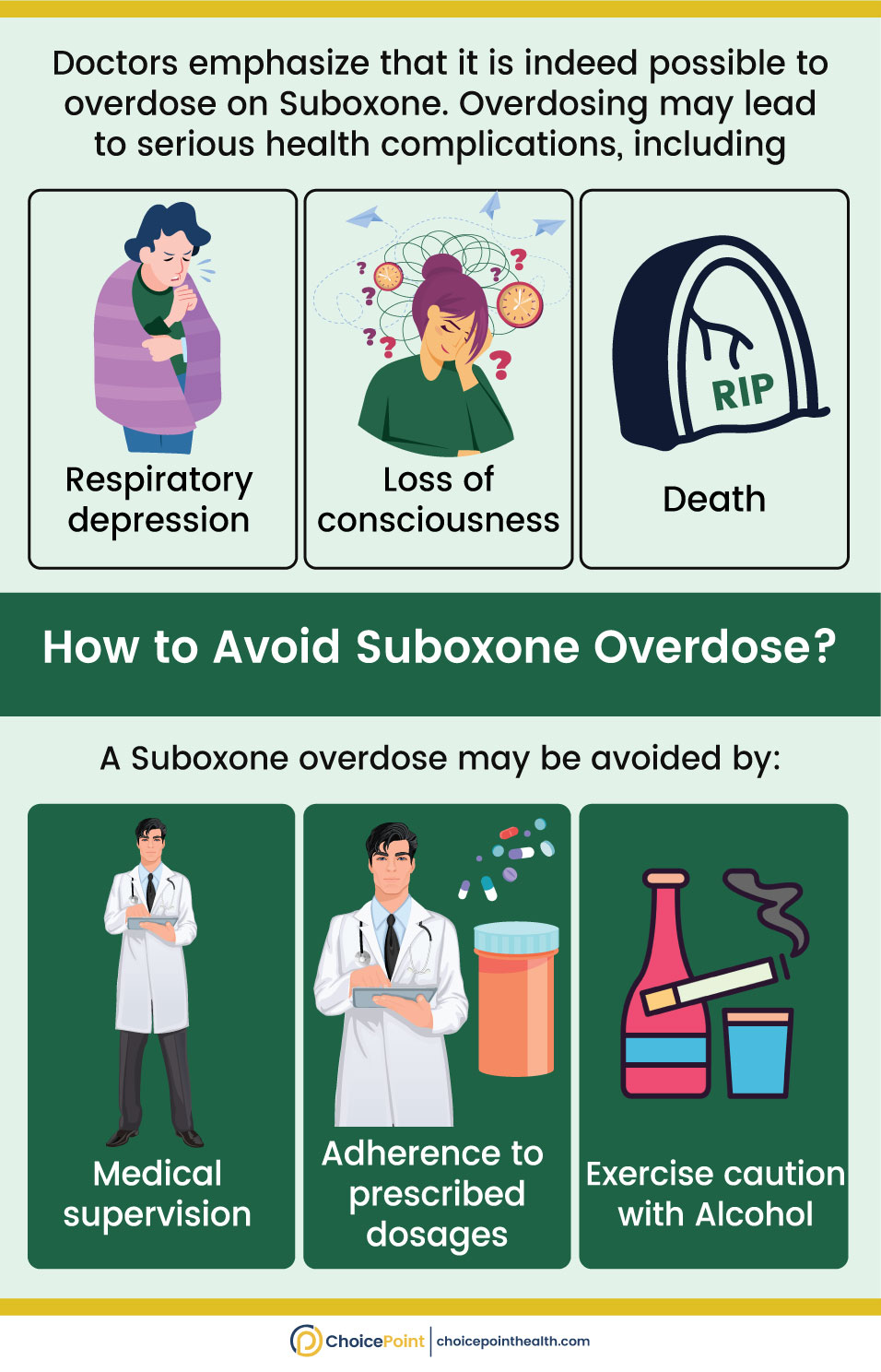Suboxone is used to treat mild to severe Opioid Use Disorder, but it is possible to overdose on Suboxone. Suppose it is not as prescribed or mixed with other drugs, especially alcohol, benzodiazepines, or other central nervous system depressants. An overdose has the potential to be life-threatening and demands prompt medical intervention to avoid fatal consequences. If you want to know whether you can overdose on Suboxone, keep reading as we dive into detail and provide preventive measures.
Table of Contents
Common Factors Contributing to Suboxone’s Popularity
Suboxone is a prescription medication that falls under the category of opioids and is mainly employed to treat opiate addiction. Suboxone has the potential to serve as an effective induction agent for stabilizing individuals experiencing withdrawal symptoms during their medical detoxification process. Additionally, it can be utilized as a maintenance treatment to facilitate recovery from opioid use disorder. Suboxone is designed to:
- alleviate the symptoms of withdrawal
- reducing cravings for Opioids
- provide stabilization during addiction recovery
Suboxone may be prescribed in Outpatient Addiction Rehabs, allowing patients to continue their treatment while maintaining their daily routines. Contact ChoicePoint, get evaluated by a DEA-certified specialist, and receive a Suboxone prescription today!
Can you Overdose on Suboxone?
Coming to the present focal point of discussion: Can you overdose on Suboxone?
The short answer is a resounding YES. You can overdose on Suboxone! We are well aware of the fact that Suboxone is classified as a partial opioid agonist.
- It possesses opioid properties with substantially weaker effects compared to commonly misused opioids like heroin, fentanyl, or oxycodone.
- Suboxone can potentially depress the central drive to breathe from the brainstem, resulting in respiratory suppression and, in extreme cases, fatality.
It is crucial to follow your healthcare provider’s instructions and consult them before altering your dosage or medication regimen.
Have you ever felt shallow breathing or extreme drowsiness while taking Suboxone? It could be one of the symptoms of a Suboxone overdose! Call our addiction specialists at ChoicePoint and get urgent help!
Factors That Increase the Risk Of A Suboxone Overdose
As we have answered whether you can overdose on Suboxone, let’s discuss the factors that play a role in a Suboxone overdose. Even though Suboxone is commonly used in medication-assisted treatment for opioid addiction, it’s essential to be aware of the factors that can increase the risk of a Suboxone overdose, including:
- Taking Suboxone without a valid prescription
- Using it in higher doses than prescribed
- Combining Suboxone and alcohol
- Certain medical conditions, such as liver or kidney problems
- Suboxone in a manner other than prescribed
If you or someone you know is experiencing an overdose or suspects an overdose, seek immediate medical assistance by contacting our doctors at ChoicePoint.
Mitigating the Risks Of Suboxone Overdose: 3 Key Preventive Measures
Any medication is effective as long as it is used as advised by your healthcare provider. Suboxone may be an FDA-approved prescription medicine used to treat opioid addiction. However, if abused, it may also cause severe effects. Want to prevent overdosing on Suboxone? Here are 3 Key Preventive Measures to think about:
Strictly Adhere To The Prescribed Dosage
It is critical to take Suboxone exactly as your healthcare provider directs to achieve the best results. Never exceed the recommended dose or increase the frequency of usage without consulting a healthcare practitioner. Taking greater doses increases the danger of overdose and Suboxone side effects. If you have any concerns or questions about your dosage, consult your healthcare provider before making any changes.
Communicate With Your Healthcare Provider
When an individual is prescribed Suboxone by a doctor, they should maintain an open contact channel with their prescribing doctor. Inform them of any changes in your condition, such as cravings, withdrawal symptoms, or worries. If necessary, they can alter your dosage or provide further assistance. Remember, it is important, to be honest and transparent with your doctor about your Suboxone usage to receive appropriate care.
Do Not Mix Suboxone and Alcohol
It is not advised to mix Suboxone and Alcohol. Suboxone and alcohol depress the central nervous system, resulting in slower breathing and lower oxygen intake. Combined, the effects can be amplified, potentially leading to severe respiratory depression. This can result in oxygen deficiency, organ damage, and even death. As Suboxone and alcohol both fall under the category of sedatives, combining them may cause sleepiness, disorientation, impaired coordination, and decreased cognitive function. Suboxone contains naloxone, which is mainly broken down by the liver. If an individual mixes Suboxone and alcohol, it may impair liver functioning.
Can you overdose on Suboxone? Yes, especially if you do not follow your doctor’s advice and these preventive measures are merely general guidelines. It is necessary to consult with a healthcare professional at ChoicePoint prescribing Suboxone for personalized guidance and support regarding your specific situation. Call our DEA-certified addiction specialist at 844.445.2563 now to contact us.

How Much Suboxone is Safe?
Common Suboxone Overdose Symptoms To Look Out For
If you or a close one is taking Suboxone, it is important to know the symptoms of a Suboxone overdose so you can reach out for urgent help in an emergency. The symptoms of a Suboxone overdose may include:
- Nausea and vomiting
- Seizures
- Abdominal pain
- Depressed breathing
- Coma
- Death
- Slowed heartbeat
- Irritability, anxiety, and mood swings
- Loss of physical coordination and appearing drunk or drugged
- Sleepiness
- Trouble concentrating or remembering things
What Should You Do if You or Someone You Know Overdoses on Suboxone?
Misuse of Suboxone is frequently followed by unpleasant withdrawal symptoms such as nausea, vomiting, body aches, sleeplessness, indigestion, diarrhea, and anxiety. Because withdrawals are more prevalent than overdoses, these indications are more common. Learn about how to manage suboxone withdrawal symptoms safely.
If you or someone you know experiences a Suboxone overdose, here are some things you may try to provide urgent care:
Monitor Vital Signs
While waiting for emergency responders to arrive, closely monitor vital signs. Check their breathing, pulse, and level of consciousness if the person becomes unresponsive or stops breathing.
Do not Induce Vomiting
Do not attempt to induce vomiting unless specifically instructed by medical professionals. The contents of the stomach can pose additional risks if aspirated.
Call Urgent Care Providers
Provide them with any relevant information about the situation. Mention that the overdose involves Suboxone and provide details about the quantity and time of ingestion, if known. This information can help medical professionals in providing appropriate treatment.
Offer Support and Reassurance
A Suboxone overdose may be distressing; offer support and reassurance while waiting for medical help. Stay with the person and keep them calm. Avoid administering any substances or medications unless instructed by medical professionals.
Suboxone Overdose May Be Fatal- Seek Help From ChoicePoint Now!
Suboxone overdose is a severe and potentially fatal condition that needs instant medical attention. Suboxone overdose is preventable and treatable, but it requires awareness and education among patients, prescribers, and the public. Suboxone is a lifesaving medication for many people who struggle with opioid addiction, but it must be used as directed and with caution. ChoicePoint offers the following addiction treatments to reverse the effects of Suboxone overdose:
- Medication-Assisted Treatment
- A 24/7 supervised detoxification program
- Psychotherapies to prevent a relapse
Suppose you or someone you know displays signs of Suboxone overdose, such as difficulty breathing, extreme sedation, or loss of consciousness. In that case, it is crucial to seek immediate medical attention. Call ChoicePoint at 844.445.2563 for immediate assistance.
Medical Disclaimer:
ChoicePoint aims to improve the quality of life for people struggling with substance use disorder and mental health issues. Our team of licensed medical professionals research, edit and review the content before publishing. However, this information is not intended to be a substitute for professional medical advice, diagnosis, or treatment. For medical advice please consult your physicians or ChoicePoint's qualified staff.











Review Can You Overdose on Suboxone- 3 Key Preventive Measures.